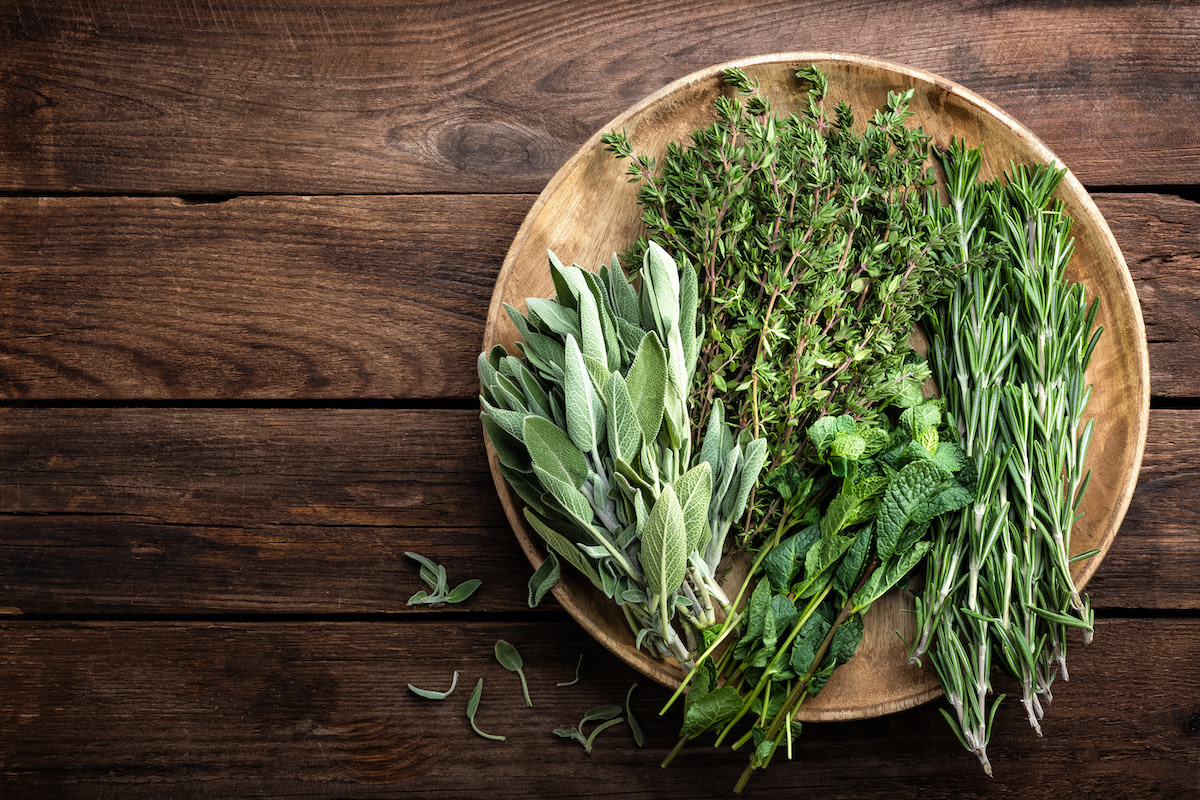Fresh vs. Dried Herbs: How to Decide Which to Use
Written by
Last updated: Oct 27, 2021 • 3 min read
Both fresh and dried herbs can add zest and flavor to a meal. Still, there are a few important differences worth noting. Learn more about fresh vs. dried herbs.
Learn From the Best
What Are Fresh Herbs?
Fresh herbs are leafy plants that can lend their flavors and aromas to various dishes. Home cooks can use them to garnish foods after the fact or cook them right into the meal. You can benefit from keeping a steady supply of herbs in your kitchen to add extra dimensions of taste and scents to your meals.
What Are Dried Herbs?
Dried herbs are simply fresh herbs that have undergone a drying process. This makes them longer-lasting and easier to store. You can find dried herbs at most grocery stores.
5 Fresh Herbs to Try
You will probably only eat certain herbs when fresh. Consider trying these five leafy herbs before they undergo drying:
- 1. Basil: While dried basil has its place, fresh basil is a hallmark of Italian cuisine in particular. For instance, it helps give pesto its unique and distinctive flavor.
- 2. Chives: Resembling scallions, chives taste similar to mild onions. Store fresh herbs like chives in a plastic bag in your refrigerator to keep them from going bad.
- 3. Cilantro: Also known as coriander, cilantro is a garnish in many dishes in Mexican cuisine. Wet these herbs and pat them down with a paper towel before using them.
- 4. Rosemary: Fresh rosemary can lend an earthier, almost mint taste to the dishes it complements.
- 5. Sage: Sprigs of fresh sage descend from the Lamiaceae family of plants, which also includes herbs like rosemary, mint, basil, and oregano. Sage often pairs well with other fresh herbs, like parsley and thyme.
5 Dried Herbs to Try
Some herbs benefit from the drying process. Try these five in their dehydrated state for even stronger flavors:
- 1. Bay leaf: Dried bay leaves figure prominently in certain potato recipes. They lend a piney taste to anything they touch.
- 2. Curry leaf: Dried curry leaves serve as the basis for many Indian dishes’ aromas and flavors. Their tangy, citrusy taste can help zest up recipes of many sorts.
- 3. Fennel: Dried fennel herbs taste a bit like licorice. Like the plant itself, the small fennel seeds can add complex flavor to a dish.
- 4. Marjoram: In the same plant family as earthy oregano, dried marjoram tastes like a milder version of the former.
- 5. Oregano: The dried version of earthy, slightly bitter oregano shows up in Italian salad dressings, pizza sauces, and other recipes.
Fresh vs. Dried Herbs
There are some key differences to consider when it comes to deciding when to use fresh herbs instead of dry ones and vice versa. Here are five of the most important:
- 1. Amount required: You’ll need to do some herb conversions if your recipe calls specifically for fresh or dried herbs and you only have the other kind. As a general rule of thumb, you need three times the amount of fresh herbs to get the same flavor as you would with one part of cooked dry herbs (cooking releases their flavors).
- 2. Cooking needs: If the recipe calls for a specific cooking process, that can affect which type of herb is better to use. If you plan to braise or cook the herbs directly in the heat, use dried herbs. If you only need to garnish the recipe after the fact, use fresh herbs.
- 3. Flavor: Dried herbs will emit a stronger flavor so long as you cook them. Heat releases the oils in them to produce a more flavorful taste. If you won’t be cooking the herbs, using fresh ones will probably be better for flavor.
- 4. Nutrients: Keep in mind that fresh herbs have higher vitamin content than dried herbs. Dried herbs lose many of these nutrients as they go through the dehydration process. Depending on how you plan to use the herbs, this fact might be of importance to you.
- 5. Shelf life: Since dried herbs undergo dehydration, they can remain in storage for much longer than fresh herbs. Fresh herbs might last a week or two in the refrigerator, but dried herbs can stay good for up to a year on your shelf.
Want to Learn More About Cooking?
Become a better chef with the MasterClass Annual Membership. Gain access to exclusive video lessons taught by the world’s best, including Mashama Bailey, Gabriela Cámara, Niki Nakayama, Chef Thomas Keller, Yotam Ottolenghi, Dominique Ansel, Gordon Ramsay, Alice Waters, and more.
